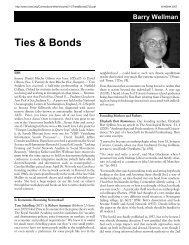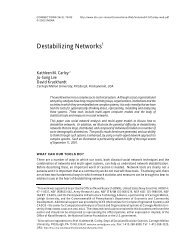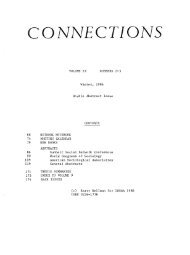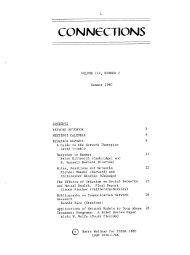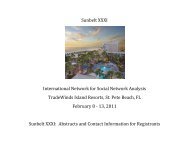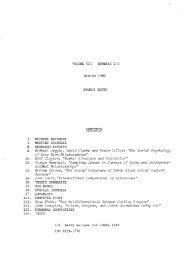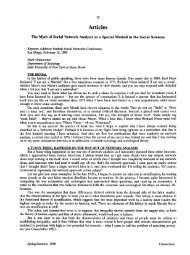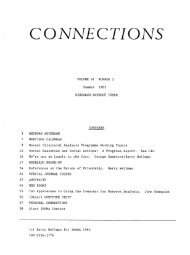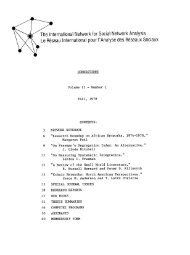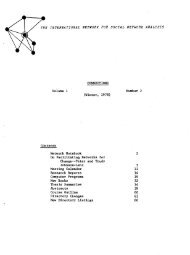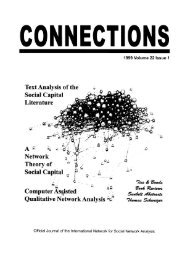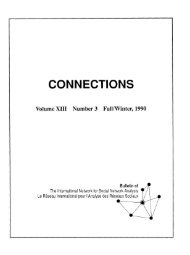(1979). Social Networks and Psychology. Connections, 2 - INSNA
(1979). Social Networks and Psychology. Connections, 2 - INSNA
(1979). Social Networks and Psychology. Connections, 2 - INSNA
Create successful ePaper yourself
Turn your PDF publications into a flip-book with our unique Google optimized e-Paper software.
- 63 -ditions of stagflationary crisis of contemporary capitalism) ; Mighael Jager "A Study on the Study of Urban<strong>Social</strong> Movements" ; Len Eastop "On Participation in an Urban Renewal Scheme" ; Michael Berry "Housing as anElement in the Reproduction of Labour Power" ; Jim Kemeny "Homeownership <strong>and</strong> Privatisation in CapitalistSocieties : A Cross-Cultural Perspective" ; Bettina Cass "A Critical Evaluation of the Concept of Consumptionin Urban Sociology" ; S .B . Aungles "The <strong>Social</strong> Consequences of Industrial Development <strong>and</strong> Industrial DeclineWhyalla : A Case Study" ; E .A . Clel<strong>and</strong> <strong>and</strong> R .J . Stimson "Equity <strong>and</strong> Services in Cities : The Example of MetropolitanAdelaide" :Terry Burke <strong>and</strong> Kath Hulse "Residential Caravans : A New Housing Class" ; Leslie Kilmartin<strong>and</strong> David C . Thorns "The Heart Possessed : Ownership of Central Business Areas in Australasia . A ResearchProposal"These papers are available, at A$3 .75 (payable to "ISA Urban Group) including surface postage, from ;Patrick Mullins, Department of Anthropology <strong>and</strong> Sociology, University of Queensl<strong>and</strong>, St . Lucia, Queensl<strong>and</strong>4067, Australia .For Neighbourhood UrbanistsUrban Affairs Quarterly will have a special issue on "The Revitalization of Inner City Neighbourhoods ."Among the topics the editors have in mind are : empirical studies on inner city revitalization ; theoreticalexplanations of the changing patterns of urban neighborhoods ; life-style differences between urban <strong>and</strong>suburban areas ; the political economy of inner city revitalization ; differences between areas that have beenaltered by governmental policies <strong>and</strong> those that have been "spontaneously" rehabilitated ; documentation ofthe extent of social organizational changes in inner cities ; the impact of population changes on thecommercial <strong>and</strong> retail life of the inner city ; intra-city migration patterns by class <strong>and</strong> status ; analysesof the displacement process <strong>and</strong> of displaced populations . Other topics would be considered . Interestedauthors should send a brief outline of the proposed contribution to Bruce London, Department of Sociology,Mary Washington College, Fredricksburg, Virginia 22401, U .S .A. Three copies of prospective papers shouldbe subiaitted by 1 June <strong>1979</strong> .World Directory of Anthropologists <strong>and</strong> EthnologistsA computer--based directory of 5000+ anthropologists <strong>and</strong> ethnologists has been developed . It can printboth lists <strong>and</strong> labels, retrieving by name <strong>and</strong> address, in conjunction with country of location, languagesused, geographical or tribal areas of interest, <strong>and</strong> subject-matter interest . All enquires should beaddressed to Jacqueline Rouah, Current Anthropology, University of British Columbia, Vancouver, B .C ., CanadaV6Y 1W5 .Letter from NottinghamThe January, <strong>1979</strong> "Urban Change <strong>and</strong> Conflict" conference (150 <strong>and</strong> attendees) was the third in a significantseries . The first in 1975 has become retrospectively famous in Engl<strong>and</strong> as it was the occasion whena number of French <strong>and</strong> Italian Marxian urbanists (perhaps Manuel Castells is the best known) gave Englishspeaking urbanists the message that their own work had seriously ignored the ways in which class structure<strong>and</strong> conflict determined urban form <strong>and</strong> process .Four years later that message sPPms to have been accepted, consolidated <strong>and</strong> frequently watered down ina mixture of British pragmatic empiricism . Most of the formal papers at the conference were couched insome sort of Marxian structural language ; the informal discussions even more so . Most papers stuck muchmore closely to empirical case study than to abstract generalization . Most tended to use a network cumstructuralist framework to organize <strong>and</strong> analyze the relationships involved .There were a number of good papers, particularly noteworthy for CONNECTIONS readers are those byRoberts, Saunders, Elliott <strong>and</strong> McCrone, Newby, <strong>and</strong> Piven <strong>and</strong> Cloward . A list of selected papers (seemeeting calendar) summaries (see Abstracts section) follows . Please note that the summaries have beenexcerpted by CONNECTIONS' editors in all but Abrams' case . The absence of a summary implies no editorialjudgement other than the difficulty of properly excerpting . The conference was sponsored by the Centrefor Environmental Studies, London .Mental Health <strong>and</strong> <strong>Social</strong> <strong>Networks</strong> : A Request for Information <strong>and</strong> AdviceChristopher Smith (Geography, Oklahoma) writes :"Beginning January 1, <strong>1979</strong>, I am working as a National Science Foundation Resident with the MentalHealth Association in Oklahoma County . This Residency is a part of NSF's Science for Society Program, <strong>and</strong>I shall be on leave from my job at the University of Oklahoma for 12 months . During that time, I shall belooking into the situation of mental patients who are discharged from the major mental hospital in centralOklahoma <strong>and</strong> who returned to live in the Oklahoma City area .The topics I shall be considering are as follows : (1) The individual search for help <strong>and</strong> serviceswithin the city . I am interested in who they go to for help both formally <strong>and</strong> informally, <strong>and</strong> what their



